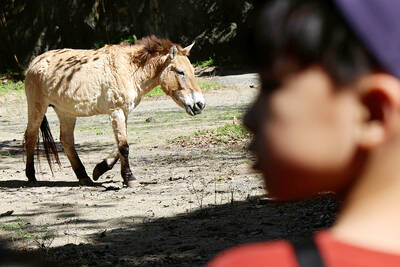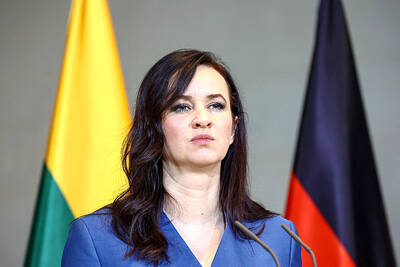A Taiwanese man who traveled in west and central Africa for a month was diagnosed with severe malaria shortly after returning, the seventh case this year, the most in the period in 19 years, the Centers for Disease Control (CDC) said yesterday.
The man in his 60s departed on a group tour in late February and returned to Taiwan on March 21, CDC Epidemic Intelligence Center Deputy Director Lee Chia-lin (李佳琳) said.
The man did not have chronic health conditions, but had symptoms including general fatigue, nausea, vomiting, diarrhea and jaundice upon his return, CDC physician Lin Yung-ching (林詠青) said, adding that the man sought treatment at a clinic and returned home to rest.

Photo courtesy of the Centers for Disease Control
However, his symptoms did not diminish and he began having chills and his urine output decreased, Lin said.
He was rushed to hospital on March 25, where he was found to have a high jaundice index and acute kidney failure, Lin said, adding that he was initially suspected to have viral hepatitis, but tested negative.
The man was hospitalized in an isolated room and reported as a suspected malaria case, Lin said, adding that he developed respiratory failure, and was intubated and admitted to an intensive care unit (ICU).
He tested positive for malaria caused by Plasmodium falciparum, which has a relatively high fatality rate, Lin said.
The man has been in the ICU for about two weeks in an unstable condition and it is unclear whether he had taken malaria prophylaxis before and during his travel to Africa, Lin said.
All seven people diagnosed with the disease this year had visited Africa before falling ill, Lee said.
In 2023, there were an estimated 263 million cases of malaria and 597,000 deaths globally, with Africa accounting for about 94 percent of the cases and 95 percent of the deaths, she said.
Ethiopia has reported more than 900,000 cases so far this year, she said, adding that the disease is spreading in some Asian countries, including India, which has reported more than 10,000 cases so far this year.
People visiting high-risk areas should book a pre-travel consultation about a month before traveling, allowing a physician to make health and risk assessments, as well as offer pre-travel vaccination, counseling and medicine, Lin said.
Malaria prophylaxis should be taken before and during a trip, but travelers should also take preventive measures against mosquito bites and watch for symptoms after returning to Taiwan — especially in the first 21 days — and tell their doctor about their travel history, he said.
Meanwhile, three new cases of measles — one local and two imported — were reported last week, Lee said.
A man in northern Taiwan was diagnosed with the disease after a friend had been in contact with a previously confirmed measles case, but the source of infection was yet to be determined, Lee said.
The two imported cases recently returned from Vietnam, she said.
As of Monday, 22 cases of measles — eight local and 14 imported from Vietnam — had been reported, with both figures the highest for the period in six years, she said.
Measles often starts with cold-like symptoms, so the three most recent cases were all initially diagnosed as the common cold when they sought treatment at clinics, she said.
However, all three were tested by hospitals after they developed rashes, she added.
CDC Deputy Director-General Philip Lo (羅一鈞) said Vietnam has reported more than 42,000 suspected cases of measles this year, including more than 4,000 confirmed through testing and five deaths.
More than 70 percent were children aged from nine months to 15 years, Lo said.
People with young children who are not fully vaccinated against measles should avoid visiting Vietnam and those who have visited countries where measles is spreading should seek medical attention if they develop suspected symptoms and tell the doctor of their recent travel history, he said.
In addition, as second doses of the JN.1-adapted COVID-19 vaccine for people aged 65 or older, indigenous people aged 55 or older and immunocompromised people became available yesterday, the CDC encourages eligible recipients to get a booster shot for better protection, Lo said.

Travel agencies in Taiwan are working to secure alternative flights for travelers bound for New Zealand for the Lunar New Year holiday, as Air New Zealand workers are set to strike next week. The airline said that it has confirmed that the planned industrial action by its international wide-body cabin crew would go ahead on Thursday and Friday next week. While the Auckland-based carrier pledged to take reasonable measures to mitigate the impact of the workers’ strike, an Air New Zealand flight arriving at Taipei from Auckland on Thursday and another flight departing from Taipei for Auckland on Saturday would have to

The Taipei City Government yesterday confirmed that it has negotiated a royalties of NT$12.2 billion (US$380 million) with artificial intelligence (AI) chip giant Nvidia Corp, with the earliest possible signing date set for Wednesday next week. The city has been preparing for Nvidia to build its Taiwan headquarters in Beitou-Shilin Technology Park since last year, and the project has now entered its final stage before the contract is signed. Taipei Mayor Chiang Wan-an (蔣萬安) said the city government has completed the royalty price negotiations and would now push through the remaining procedures to sign the contract before

Taipei Zoo welcomes the Lunar New Year this year through its efforts to protect an endangered species of horse native to central Asia that was once fully extinct outside of captivity. The festival ushering in the Year of the Horse would draw attention to the zoo’s four specimens of Przewalski’s horse, named for a Russian geographer who first encountered them in the late 19th century across the steppes of western Mongolia. “Visitors will look at the horses and think that since this is the Year of the Horse: ‘I want to get to know horses,’” said zookeeper Chen Yun-chieh, who has been

The Ministry of Foreign Affairs on Thursday said the name of the Taiwanese Representative Office in Lithuania was agreed by both sides, after Lithuania’s prime minister described a 2021 decision to let Taiwan set up a de facto embassy in Vilnius as a “mistake.” Lithuanian Prime Minister Inga Ruginiene, who entered office in September last year, told the Baltic News Service on Tuesday that Lithuania had begun taking “small first steps” aimed at restoring ties with Beijing. The ministry in a statement said that Taiwan and Lithuania are important partners that share the values of freedom and democracy. Since the establishment of the